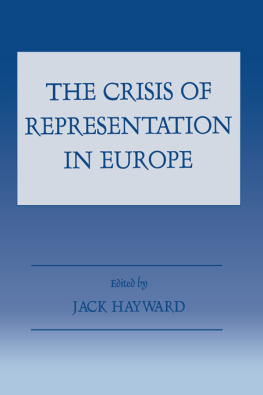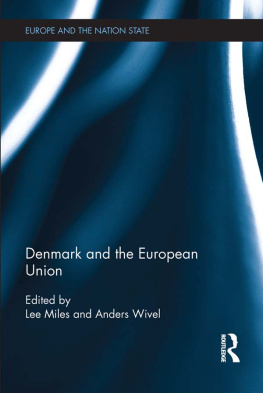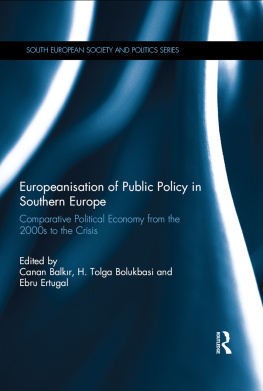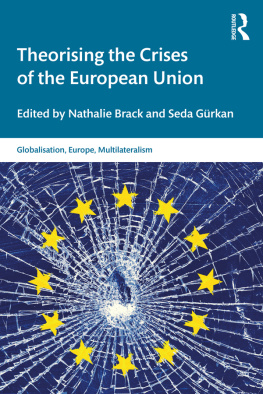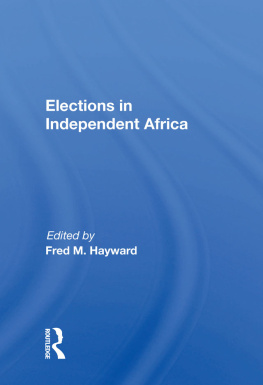First published 1995 in Great Britain by
FRANK CASS & CO. LTD
2 Park Square, Milton Park,
Abingdon, Oxon, OX14 4RN
and in the United States of America by
FRANK CASS
270 Madison Ave,
New York NY 10016
Transferred to Digital Printing 2005
Copyright 1995 Frank Cass & Co. Ltd.
British Library Cataloguing in Publication Data
Crisis of Representation in Europe.
(Special Issue of West European
Politics, ISSN 0140-2382)
I. Hayward, J. E. S. II. Series
324.94
ISBN 0-7146-4656-3 (cloth)
ISBN 0-7146-4184-7 (paper)
Library of Congress Cataloging-in-Publication Data
A catalog record for this book is available from the
Library of Congress
This group of studies first appeared in a Special Issue on The Crisis of Representation in Europe of West European Politics, Vol. 18, No. 3 (July 1995), published by Frank Cass & Co. Ltd.
All rights reserved. No part of this publication may be reproduced in any form or by any means, electronic, mechanical, photocopying, recording or otherwise, without the prior permission of Frank Cass and Company Limited.
Typeset by Frank Cass & Co. Ltd.
Preface
JACK HAYWARD
Representation long predated universal suffrage. The advent of mass democracy in a world in which elites were accustomed to take decisions (including political decisions) meant that the legitimacy of those in positions of authority was open to challenge from below. The notion of popular sovereignty implied that the people should not merely support those in power but exercise power themselves. This claim was circumvented in the nineteenth and early twentieth centuries by the view that direct democracy being impracticable in large states, it was both necessary and desirable that power should be entrusted to the few by the many. However, the latter could withdraw their consent periodically at elections, when competing candidates solicited their votes.
Where the intermediating organisations between the government and the governed, notably political parties and organised interests, operated effectively in synchronising the wishes of the public and the actions of those in office, the political system managed with the indirect influence of the people on the politicians. However, the latter never enjoying a particularly high public regard recent years suffered a measure of discredit (often deserved) that has induced a disaffection with the process by which legitimate authority has been transmitted upwards from the people. The current crisis has been a long time in the making, but it has come to a head as a result of the apparent incapacity of European political systems, in many of the individual states and collectively in the European Union, either to satisfy the basic expectations of their citizens or to leave them in peace.
The contributions that follow are the revised versions of papers presented to a workshop held in Oxford in October 1994, thanks to financial support from the British Academy, West European Politics and the University of Oxford European Studies Fund. They start from a fundamental interrogation about whether representative institutions within the European Union can exist without a European people, and argue that this requires the separation of citizenship from any ethnic-based sense of nationhood. European governance as a composite international, supranational and infranational set of disaggregated processes is then investigated. The two articles on political parties consider the way in which they have become simultaneously closer to government and lost touch with their electorates, as well as the problems that national parties have had in developing a European party system. Recourse to referendums as a way of providing public support for major decisions relating to the European Union is then examined to demonstrate that the results reflect the popularity of the government asking the question rather than public attitudes on the issue itself.
The enduring importance of national parliaments is emphasised in providing representative legitimacy as a basis of the developing European Union institutions, despite the fact that they have receded in their capacity to exercise control over their own national governments. The need for consensus between states, rather than majority rule, reinforces the view that it is not the lack of the development of a European party system or a more powerful European Parliament to which the representative failings of the present arrangements should be attributed.
The problems posed by pursuing European integration in a context of economic recession are discussed in terms of alternative explanations: an economic determinism that will lead to a resurgence of the integrative impetus, with the resumption of expansion and a decline in unemployment, or a structuralist interpretation in which the loss of political impetus derives mainly from the end of the Cold War and the globalisation of economic competition that remove the incentives to regional European integration. The technocratic emphasis, which largely excluded public involvement in the working of European institutions from their inception, has meant that as intergovernmental bargaining has reached the limits of the practicable in an enlarged Union, the protagonists of closer integration have not been able to mobilise public support for a policy of incremental federalism pursued by stealth. This has led some to seek European integration through subnational mobilisation at the regional level, which is closer to the public in its preoccupation with day-to-day policy decisions.
The current lack of public enthusiasm for European integration was reflected in the dishearteningly low turnout for the 1994 European elections, which continued to concentrate on national issues despite desultory efforts to promote transnational party campaigns. Populist protest found expression in the votes for parties and movements that adopted an anti-Establishment stance. The unwillingness of national political leaders to create effective democratic European institutions, particularly evident in the United Kingdom, France and Denmark, has led part of their publics to retreat into a backward-looking and defensive (if not defeatist) preoccupation with their own interests.
The process of European integration has, hitherto, not proceeded in a linear fashion. It has advanced with pauses and retreats. The tension between what the modernising and extrovert political, economic and administrative elites see as desirable objectives, and the reticences, suspicions and repulsions felt by their more traditionalist and introvert mass publics, is now new. The current challenge to Europes leaders is to persuade their peoples that what most of their representatives regard as indispensable should be implemented in the coming years. It is a matter of concern that so many of them have for the present chosen to lie low, a reflection of the contemporary crisis of representation.
The Editor and authors would like to thank the discussants at the workshop David Butler, Vernon Bogdanor, David Hine, Iain Mclean, Martin Westlake and Vincent Wright for their comments on the first drafts of the contributions that follow.

